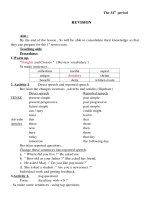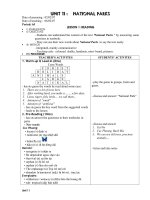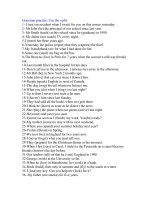Giao an Tieng Anh 8
Bạn đang xem bản rút gọn của tài liệu. Xem và tải ngay bản đầy đủ của tài liệu tại đây (77.81 KB, 11 trang )
<span class='text_page_counter'>(1)</span><div class='page_container' data-page=1>
<b>PHÒNG GIÁO DỤC HUYỆN PHÙ MỸ</b>
<b>TRƯỜNG TRUNG HỌC CƠ SỞ MỸ THÀNH</b>
<b>TỔ : ANH-NHẠC-HỌA</b>
<b>ĐỀ CƯƠNG ƠN TẬP</b>
<b>TIẾNG ANH 8</b>
<b>Năm học : 2007 - 2008</b>
</div>
<span class='text_page_counter'>(2)</span><div class='page_container' data-page=2></div>
<span class='text_page_counter'>(3)</span><div class='page_container' data-page=3>
TÊN
CHƯƠNG BÀI KIẾN THỨC TRỌNG TÂM
KỸ
NĂNG CÂU HỎI ĐÁP ÁN
BOÅ
SUNG
1 2 3 4 5 6
U
N
IT
O
N
E
M
Y
F
R
IE
N
D
S
I/-Adjective + enough + (for somebody)
to do something.
Ex: The weather is fine enough for us to
go camping.
We are old enough to understand the
situation.
II/- The simple present.
S + V (s, es) + O + A.
Ex: the earth is round.
Note: The simple present is used to
express the idea that is always true.
Ex : The earth moves around the sun.
Children like candies.
III/- The simple past tense.
Form: S + V-ed/V2 + O.
Ex: I went to the cinema last night.
She watched TV two hours ago.
<i>I/- Give correct tense of the verbs in</i>
<i>the parentheses.</i>
Nieân (be) Hoa’s next-door neighbor
in Hue. She (be) very beautiful. She
(have) big brown eyes and a lovely
smile. Last week, she (go) to Hanoi
(visit) Hoa. They (travel) around
the city and (see) a lot of interesting
places. Nien (think) Hanoi (be)
beautiful but so noisy and busy, so
he (not like) (live) there.
<i>II/- Combine each pair of sentences</i>
<i>into a new one using “enough”</i>
1. The worker is clever. He can
make fine things from wood.
2. The weather is fine. We could go
camping.
3. Mr. Robinson isn’t rich. He can’t
buy a car.
<i>I/- Give correct tense of the verbs</i>
<i>in the parentheses.</i>
Nieân is Hoa’s next-door neighbor
in Hue. She is very beautiful. She
<b>has big brown eyes and a lovely</b>
smile. Last week, she went to
Hanoi to visit Hoa. They traveled
around the city and saw a lot of
interesting places. Nien thinks
Hanoi is beautiful but so noisy and
busy, so he doesn’t like living
there.
<i>II/- Combine each pair of</i>
<i>sentences into a new one using</i>
<i>“enough”</i>
1. The worker is clever enough to
<b>make fine things from wood.</b>
2. The weather is fine enough for
<b>us to go camping.</b>
3. Mr. Robinson isn’t rich enough
<b>to buy a car.</b>
I/- Commands.
-Form:
Can I + bare-inf + O ?
Let me + bare-inf + O.
Usage: used to suggest oneself to do
something for others.
<i>I/- Give correct form of the verb in</i>
<i>brackets.</i>
1. He (read) ……a book tonight.
2. Can you (do)…… me a favor?
3. This exercise is difficult. Let me
… (help) you.
<i>I/- Give correct form of the verb in</i>
<i>brackets.</i>
1. He is going to read a book
tonight.
2. Can you do me a favor?
</div>
<span class='text_page_counter'>(4)</span><div class='page_container' data-page=4>
1 2 3 4 5 6
U
N
IT
T
W
O
M
A
K
IN
G
A
R
R
A
N
G
EM
EN
T
Ex: Can I help you?
Let me help you lift the box.
+ Let’s + bare-inf + O.
Usage: used to suggest someone to do
something with oneself.
Ex: Let’s go to the cinema tonight.
Let’s not talk in class.
II/- Future of intention
Form : to be going to + bare-inf.
Usage: use to express a plan.
III/- Adverbs of place.
Ex: outside >< inside
There >< here
Upstair >< downstair
<i>II/- Rewrite the following sentences</i>
1. Quang and Nam bought new
fishing rods yesterday.
They are ………
2. Vaân has a lot of homework in
Math and she is going to have Math
at school tomorrow.
Vaân is ………
<i>III/- Fill preposition in the blanks</i>
1. Where is Tuan? – He is ……….
2. No, I think he is downstair.
3. He isn’t here. May be he is …………
II/- <i>Rewrite the following</i>
<i>sentences</i>
1. Quang and Nam bought new
fishing rods yesterday.
They are going to go fishing.
2. Vaân has a lot of homework in
Math and she is going to have
Math at school tomorrow.
Van is going to do her
homework.
III/- <i>Fill preposition in the blanks</i>
1. Where is Tuan? -He is upstair
2. No, I think he is downstair.
3. He isn’t here. May be he is
<b>there</b>
U
N
IT
T
H
R
EE
A
T
H
O
M
E
I /- Modals:
Form: S + modal + bare-inf.
Ex: I can swim
She can swim
Note: some modals : must, have to,
should, ought to, may, might, shall, will…
I/- <i>Complete the following sentences</i>
<i>with have to or must.</i>
1. I …… do my homework everyday.
2. We haven’t got much time. We
…… hurry.
3. Sorry. We …… go or we will miss
the last train.
4. Many children in Britain …… wear
uniform
<i>II/- Use ought to or should to make</i>
<i>advice to a friend.</i>
1. Your friend has a bad cold.
2. Your friend is riding a bicycle so
fast.
3. Your friend has a bad toothache.
I/- <i>Complete the following</i>
<i>sentences with have to or must.</i>
1. I must do my homework
everyday.
2. We haven’t got much time. We
<b>have to hurry.</b>
3. Sorry. We have to go or we
will miss the last train.
4. Many children in Britain have
<b>to wear uniform</b>
<i>II/- use ought to or should to make</i>
<i>advice to a friend.</i>
</div>
<span class='text_page_counter'>(5)</span><div class='page_container' data-page=5>
1 2 3 4 5 6
U
N
IT
F
O
U
R
O
U
R
P
A
ST
I/- The simple past with “ used to”
Form: S + used to + bare-inf + O …
Usage: used to express a habbit in the
past but it no longer exits now.
II/- Prepositions of time
In, on, at, after, before, …
Ex: at 3 a.m, night, lunch, …
On Monday, september 2nd<sub> , …</sub>
In January, 1999, …
I/- <i>Fill in the blanks with suitable</i>
<i>prepositions.</i>
1. What do you do … sunady?
2. I was born … January, 1st<sub> 1990</sub>
3. It often rains … October in Viet
Nam.
4. You want to watch the sky …
sunset
5. What did they do … the ninth of
April, 2000?
II/- <i>Make completed sentences.</i>
1. Everyone / be / busy / Tet
holiday.
2. I / used / listen / music / evening.
3. They / going / have / final
exams / june.
I/- <i>Fill in the blanks with suitable</i>
<i>prepositions.</i>
1. What do you do on sunady?
2. I was born on January, 1st<sub> 1990</sub>
3. It often rains in October in Viet
Nam.
4. You want to watch the sky at
sunset
5. What did they do on the nineth
of April, 2000?
II/- <i>Make completed sentences.</i>
1. Everyone is busy on Tet
holiday.
2. I used to listen to music in the
evening.
3. They are going to have final
exams in june.
U
N
IT
F
IV
E
ST
U
D
Y
H
A
B
IT
S
I/- Adverbs of manner.
Form: adj + ly Adv of manner.
Ex: careful carefully
Quick quickly.
Note: fast fast
Far far
Good well
Position: adv of manner stands after the
verb of the sentence to modify the verb.
If the verb of the sentence has an object,
it stands after the object.
II/- Commands, requests and advice
1. advices
Form: S + should + bare-inf ..
Usage: used to advise someone to do
something.
<i>I/- Choose the best answer to</i>
<i>complete the following sentences</i>
1. He won the games because he
played … (well, good)
2. He had an accident because he
was driving too …… (fast, fastly)
3. Her English is quite ……… (fluent,
fluently)
4. You look … ! Are you all right?
(terrible, terribly)
5. She fell and hurt herself … (bad,
badly)
<i>I/- Choose the best answer to</i>
<i>complete the following sentences</i>
1. He won the games because he
played well
2. He had an accident because he
was driving too fast
3. Her English is quite fluent
4. You look terrible ! Are you all
right?
</div>
<span class='text_page_counter'>(6)</span><div class='page_container' data-page=6>
1 2 3 4 5 6
U
N
IT
F
IV
E
Ex: My sister should do her homework
before going to school.
* Commands
Form: bare-inf + O , please.
Usage: Used to order S.O to do S.th
Ex : Please open the door.
* Requests
Form: Can/Could + S + bare-inf + O …
Usage: used to request S.O to do S.th
Ex: Can you do me a favor, please?
III/- Commands, requests and advice in
reported speech
Form:
S + tell/ask/advise + S.O (not) to-inf + O
Ex: She said to Jim: “Get out”
She told Jim to get out.
Ex: She said to him: “Don’t smoke”
She told him not to smoke.
<i>II/- Change the following sentences</i>
<i>into reported speech.</i>
1. You should stay in bed for a few
days.
The doctor said ………
2. “You ought not to eat fatty food”
His mother said ……….
3. Their mother said to them:
“Don’t make so much noise”
Their mother told them …………
4. Mrs Jackson said to Tim: “Could
you give me a hand, please?”
Mrs Jackson asked Tim …………
5. She said to her soon: “Go straight
upstairs and get into bed”
She told her son ………….
<i>II/- change the following sentences</i>
<i>into reported speech.</i>
1. You should stay in bed for a
few days.
The doctor said I should satay
in bed for a few days.
2. “You ought not to eat fatty
food”
His mother said he ought not to
eat fatty food.
3. Their mother said to them:
“Don’t make so much noise”
Their mother told them not to
make so much noise.
4. Mrs Jackson said to Tim:
“Could you give me a hand,
please?”
Mrs Jackson asked Tim to give
her a hand.
5. She said to her soon: “Go
straight upstairs and get into bed”
She told her son to go staight
</div>
<span class='text_page_counter'>(7)</span><div class='page_container' data-page=7>
U
N
IT
S
IX
TH
E
Y
O
U
N
G
P
IO
N
EE
R
S
C
LU
B
Gerund (V-ing)
Form:
Like,love, enjoy, hate…+ gerund (V-ing)
Usage:
+ As an object: He like reading books
+ As a subject:
Ex: Smoking is bad for our health.
<i>I/- Give correct form of the verbs in</i>
<i>the brackets.</i>
1. Hoa want (go) to West Lake
Water Part this Sunday.
2. Nam doesn’t think so. He thinks
of (watch) football match on TV.
3. After (do) her homework, Lan
usually listen to the plays on radio.
<i>I/- Give correct form of the verbs</i>
<i>in the brackets.</i>
1. Hoa want to go to West Lake
Water Part this Sunday.
2. Nam doesn’t think so. He thinks
of watching football match on
TV.
3. After doing her homework, Lan
usually listens to the plays on
radio.
1 2 3 4 5 6
+ After preositions:
ex: He is fond of watching TV
I am thinking about going camping in
the mountain.
4. Ba likes sports, especially (play)
football and (swim)
5. The Y & Y members raise fun by
(collect) used paper and bottles and
broken glasses.
</div>
<span class='text_page_counter'>(8)</span><div class='page_container' data-page=8>
U
N
IT
S
EV
EN
M
Y
N
EI
G
H
B
O
R
H
O
O
D
I/- The present perfect tense with “for ,
since”
Form:
(+) S + have / has + past participle.
Note: past participle = V-ed / V3
Ex: I have worked for three years.
She has worked since 1990.
(-) S + have/has + not + PP + O + A.
Note: have not = haven’t
Has not = hasn’t
Ex: I haven’t worked for three years.
She hasn’t worked since 1990.
(?) Have/Has + S + PP + O + A?
ex: Have you worked for three years?
Has she worked since 1990?
Usage: used to express a situation that
began in the past and continues to the
present.
Note: since + a particular time.
For + a duration of time.
II/- Comparative.
1. as + adj + as
ex: My mother is as kind as my
mother.
2. not as + adj + as
ex: I am not as tall as my brother.
3. like, (not) the same as, different
from
<i>I/- Fill in the blanks with for or</i>
<i>since.</i>
1. He’s been in China ……… January.
2. She has lived in HaNoi ………
1950.
3. They haven’t seen each other
……… a long time.
4. My mother has worked in this
hospital ……… 9 years.
<i>II/- Give correct form of the verb in</i>
<i>the brackets.</i>
1. I (know) Lan for some months.
2. We (not see) Nga sine Monday.
3. Peter (be) ill for a week?
4. It (start) raining an hour ago.
5. Lan (be) in the USA for 2 years.
<i>III/- Rewrite the following</i>
<i>sentences.</i>
1. Jill is more intelligent than Bill.
Bill is not ………
2. Cats aren’t friendly, but dogs are
friendly.
Cats are different …
<i>I/- Fill in the blanks with for or</i>
<i>since.</i>
1. He’s been in China since
January.
2. She has lived in HaNoi since
1950.
3. They haven’t seen each other
for a long time.
4. My mother has worked in this
hospital for 9 years.
<i>II/- Give correct form of the verb</i>
<i>in the brackets.</i>
1. I have known Lan forsome
months.
2. We have not seen Nga sine
Monday.
3. Has Peter been ill for a week?
4. It started raining an hour ago.
5. Lan has been in the USA for 2
years.
<i>III/- Rewrite the following</i>
<i>sentences.</i>
1. Jill is more intelligent than Bill.
Bill is not as intelligent as Jill.
2. Cats aren’t friendly, but dogs
are friendly.
Cats are different from dogs.
1 2 3 4 5 6
Ex:
He climbs like a monkey.
I will not do the same as you.
We are different from you.
3. You hair is black, mine is black,
too.
Your hair is ………….. color as ……..
3. You hair is black, mine is black,
too.
</div>
<span class='text_page_counter'>(9)</span><div class='page_container' data-page=9>
U
N
IT
E
IG
H
T
C
O
U
N
TR
Y
LI
FE
A
N
D
C
IT
Y
LI
FE
I/- Present progressive tense.
Form:
S + is / are / am + V-ing + O + A.
Ex: he is going to school.
They are doing their homework.
I am watching TV.
Usage:
<i>1.</i> It expresses an activity that is in
progress at the moment of
speaking.
Ex: I am cooking at the moment.
<i>2.</i> used to talk about the future.
Ex: He is leaving on Sunday.
<i>3.</i> Used to show changes with <i>get</i>
and <i>become.</i>
Ex: The climate is getting warmer.
II/- Superlative.
1. The adj + est
Ex: the biggest, the tallest
2. The most + adj
Ex: the most beautiful.
<i>I/- Fill in the blanks with “get” or</i>
<i>“become”.</i>
1. Computer ………… important in our
life.
2. The world’s population ……… big
3. The problem of food for
everyone in the world ……… bad.
4. Many of the world’s seas, rivers,
and lakes ………… polutted.
<i>II/- Write the comparative form or</i>
<i>supperlative form of the words in</i>
<i>brackets.</i>
1. London is (big) than
Birmingham.
2. The weather is getting (bad)
3. It’s (hot) day of the year.
4. Who is (clever) in class?
5. It was (boring) speech I’ve ever
heard.
<i>I/- Fill in the blanks with get or</i>
<i>become.</i>
1. Computer is getting important
in our life.
2. The world’s population is
<b>getting big</b>
3. The problem of food for
everyone in the world is
<b>becoming bad.</b>
4. Many of the world’s seas,
rivers, and lakes is becoming
polutted.
<i>II/- Write the comparative form or</i>
<i>supperlative form of the words in</i>
<i>brackets.</i>
1. London is bigber than
Birmingham.
2. The weather is getting worse
3. It’s the hottest day of the year.
4. Who is the cleverest in class?
5. It was the most boring speech
I’ve ever heard.
</div>
<span class='text_page_counter'>(10)</span><div class='page_container' data-page=10>
<i> Mỹ Thành</i>, ngày ………, tháng ………, năm 2007
DUYỆT CỦA TỔ CHUYÊN MÔN GVBM
<i> Bùi Thị Hiệp</i>
DUYỆT CUÛA BGH
</div>
<span class='text_page_counter'>(11)</span><div class='page_container' data-page=11>
1 2 3 4 5 6
U
N
IT
N
IN
E
I/- in order (not) to / so as (not) to
Form: in order (not) to / so as (not) to +
bare-inf + O …, S + V + O …
Ex: In order to be healthy, he does
morning exercises.
S + V + O … in order (not) to / so as (not)
to + bare-inf + O …
Ex: We learn Englishso as to
communicate with people in the world.
II/- Simple future tense.
Form: S + will/shall + bare-inf …
Ex: I will go to the cinema with you.
Note: will not = won’t
Shall not = shan’t
III/- Modal will to make requests, offers
and promises.
Ex: Will you get me a newspaper while
you are out?
Will you keep quite, please!
Ex:
He climbs like a monkey.
I will not do the same as you.
We are different from you.
3. You hair is black, mine is black,
too.
Your hair is ………….. color as ……..
3. You hair is black, mine is black,
too.
</div>
<!--links-->









